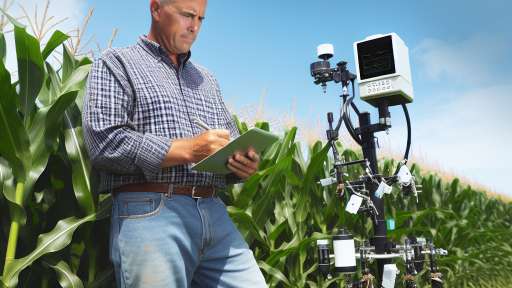Introduction to Climate-Resilient Agriculture and Its Economic Importance
Climate-resilient agriculture addresses challenges posed by climate change.
This approach enhances food security while supporting farmers’ livelihoods.
Moreover, it minimizes environmental impact, promoting sustainability.
Farmers increasingly face unpredictable weather patterns and extreme events.
As a result, adopting climate-resilient practices becomes crucial.
The Role of Adaptation in Agriculture
Adaptation ensures agricultural systems remain productive under changing conditions.
It involves adjusting practices to withstand climate variations.
For instance, crop diversification reduces risk and enhances resilience.
Farmers can also utilize drought-resistant crop varieties.
Such strategies foster sustainability and reduce dependency on external resources.
Economic Significance of Climate-Resilient Practices
Investing in climate-resilient agriculture yields significant economic benefits.
Efforts in this direction can lead to increased productivity.
Furthermore, such practices can lower operational costs over time.
Additionally, they ensure farmers maintain their income during adverse conditions.
In the long run, resilience improves community and regional economies.
Transform Your Agribusiness
Unlock your farm's potential with expert advice tailored to your needs. Get actionable steps that drive real results.
Get StartedGovernment and Institutional Support
Government policies play a pivotal role in promoting climate-resilient agriculture.
Financial incentives encourage farmers to adopt sustainable practices.
Grants and subsidies can offset the initial investment costs.
Furthermore, training programs educate farmers about innovative techniques.
Collaboration between government and agricultural organizations enhances support.
Case Studies in Successful Implementation
Examining successful case studies illustrates effective climate-resilient practices.
In Kenya, farmers have adopted agroforestry, improving soil health and yields.
Similarly, India’s water management techniques have significantly aided farmers.
Both examples highlight the potential for scalable solutions worldwide.
Such success stories encourage broader adoption of these practices.
Understanding the Impacts of Climate Change on Agriculture
Altered Weather Patterns
Climate change significantly alters weather patterns across the globe.
These changes lead to unpredictable rainfall and extreme weather events.
Farmers face challenges in adhering to traditional farming schedules.
Soil Health and Degradation
Climate change adversely affects soil health and fertility.
Changes in moisture levels can increase soil erosion.
Additionally, higher temperatures may reduce nutrient availability.
Crops and Yields
Crop yields are increasingly threatened by climate variability.
Some crops may struggle to thrive in shifting temperature regimes.
For instance, staple crops like wheat and corn face risks.
Consequently, many farmers must adapt to lower productivity.
Pest and Disease Incidences
Increased temperatures may enhance pest mobility and breeding cycles.
Farmers may encounter more frequent pest outbreaks and plant diseases.
This dynamic puts additional pressure on agricultural yields and productivity.
Economic Implications
Climate impacts can lead to increased costs for farmers.
Showcase Your Farming Business
Publish your professional farming services profile on our blog for a one-time fee of $200 and reach a dedicated audience of farmers and agribusiness owners.
Publish Your ProfileHigher expenses arise from the need for irrigation, fertilizers, and pest control.
Moreover, these pressures can result in reduced profits and financial instability.
Adaptation and Mitigation Strategies
Farmers must employ strategies to mitigate climate impacts.
This includes diversifying crop rotations and improving water management.
Furthermore, adopting sustainable practices can enhance resilience.
Economic Benefits of Climate-Resilient Practices
Increased Crop Yields
Implementing climate-resilient practices leads to increased crop yields.
For instance, Green Acres Farm adopted drought-resistant seeds.
This approach improved their maize yield by 30% in dry seasons.
Moreover, farmers experience more consistent harvests annually.
Cost Reductions
Climate-resilient agricultural practices can significantly reduce costs.
Sunny Fields transitioned to regenerative agriculture techniques.
They saw a 20% decrease in fertilizer expenses after two years.
This change also improved soil health, enhancing water retention.
Access to New Markets
Engaging in sustainable practices opens access to new markets.
Green Valley Produce became certified organic due to their methods.
This certification attracted new clientele focused on sustainability.
Likewise, they could sell their products at premium prices.
Improved Resilience to Climate Variability
Farmers adopting climate-resilient strategies show improved resilience.
For example, Bright Fields integrated polycropping systems.
This practice mitigates risks related to pest outbreaks and crop failure.
Consequently, they adapted better to weather extremes.
Enhanced Soil Health
Soil health plays a critical role in agricultural productivity.
Implementing cover crops boosts soil nutrients and structure.
Dusty Fields Dairy Farm experienced enhanced soil biodiversity.
Ultimately, this led to better yields and reduced erosion.
Community and Economic Development
Climate-resilient agriculture fosters community growth.
For instance, local cooperatives formed to pool resources.
These cooperatives provide farmers with training and tools.
As a result, they strengthen local economies through better practices.
Explore Further: Adaptation Strategies for Farmers in Changing Climates
Investment Strategies for Promoting Sustainable Agricultural Practices
Access to Financing
Accessing financing is crucial for farmers adopting sustainable practices.
Smallholder farmers often face financial barriers.
Microloans can provide necessary capital for these farmers.
Additionally, local banks can offer tailored loan products.
This fosters investment in sustainable techniques.
Public-Private Partnerships
Forming public-private partnerships strengthens agricultural sustainability.
Government entities can collaborate with businesses effectively.
Such partnerships can facilitate cutting-edge research funding.
Moreover, they can share expertise and resources.
This enables farmers to access innovative technologies.
Showcase Your Farming Business
Publish your professional farming services profile on our blog for a one-time fee of $200 and reach a dedicated audience of farmers and agribusiness owners.
Publish Your ProfileIncentives for Sustainable Practices
Offering incentives encourages farmers to adopt eco-friendly methods.
Government subsidies can effectively lower the cost of sustainable inputs.
Tax breaks for renewable energy investments are also beneficial.
Furthermore, grants can support training programs for farmers.
This can greatly enhance their operational efficiency.
Investment in Research and Development
Investing in research is vital for advancing agricultural sustainability.
Research helps identify effective sustainable practices.
Collaboration with universities can yield innovative solutions.
This research can improve crop resilience and yields.
Subsequently, farmers can better adapt to climate changes.
Adoption of Technology
Technology plays a key role in sustainable agriculture.
Investing in precision farming tools increases efficiency.
Furthermore, these tools minimize waste and input costs.
Farm management software can help optimize resource usage.
By embracing technology, farmers can achieve higher productivity.
Market Development for Sustainable Products
Developing markets for sustainable products is essential for growth.
Consumer demand for organic produce continues to rise.
Farmers can benefit from this trend with proper marketing strategies.
Collaborating with food cooperatives can expand market reach.
This creates a robust ecosystem for sustainable agriculture.
Uncover the Details: Innovative Water Recycling Methods in Agriculture
Policy Frameworks Supporting Climate-Resilient Agriculture
Importance of Policy Frameworks
Effective policy frameworks are crucial for fostering climate-resilient agriculture.
They provide guidance and structure for agricultural practices that can withstand climate challenges.
Additionally, these frameworks promote sustainable land use and resource management.
International Agreements and Commitments
International agreements play a significant role in shaping climate-resilient policies.
The Paris Agreement sets a global target for reducing greenhouse gas emissions.
Countries commit to implementing strategies that enhance agricultural resilience.
These commitments encourage investments in sustainable agricultural practices.
National Policies and Initiatives
National governments must develop policies that address climate resilience in agriculture.
For instance, the U.S. Department of Agriculture focuses on climate-smart practices.
This includes supporting farmers through financial incentives and educational programs.
Moreover, national policies should promote research on climate adaptation strategies.
Local and Regional Policies
Local governments also play a vital role in agricultural resilience.
They can tailor policies to the specific needs of their communities.
Regional initiatives often include water management plans and soil conservation measures.
Furthermore, local policies can encourage collaboration among farmers for resource sharing.
Public-Private Partnerships
Public-private partnerships are essential for advancing climate-resilient agriculture.
These collaborations can lead to innovative solutions for agricultural challenges.
Corporations often provide funding, technology, and expertise to support farmers.
In return, these companies can enhance their corporate social responsibility profiles.
Showcase Your Farming Business
Publish your professional farming services profile on our blog for a one-time fee of $200 and reach a dedicated audience of farmers and agribusiness owners.
Publish Your ProfileMonitoring and Evaluation Mechanisms
Monitoring and evaluation mechanisms help assess the effectiveness of policies.
Data collection allows governments to adjust strategies based on outcomes.
Furthermore, these mechanisms ensure accountability and transparency in implementation.
Regular assessments can identify areas for improvement and best practices.
Discover More: Climate-Smart Farming: Essential Adaptation Strategies
Role of Technology in Enhancing Agricultural Resilience and Economic Returns
Innovative Farming Techniques
Farmers increasingly adopt precision agriculture technologies.
This method uses GPS and data analytics to improve crop yields.
Moreover, it minimizes waste and conserves resources.
Consequently, farmers achieve higher efficiency levels.
Climate Adaptation Tools
Climate-smart tools help farmers adjust to changing weather patterns.
For instance, satellite imaging provides insights into crop health.
These insights enable proactive decision-making.
Farmers can therefore respond quickly to climatic changes.
Improved Crop Varieties
Genetic modification and selective breeding create resilient crops.
These crops withstand drought, disease, and pests more effectively.
Farmers can thus maintain productivity under adverse conditions.
This leads to stable economic returns even during challenging times.
Digital Platforms for Market Access
Technology bridges gaps between farmers and markets.
Online platforms connect farmers directly with consumers.
This access enhances profitability and reduces intermediary costs.
Farmers can thus receive fair prices for their produce.
Data-Driven Decision Making
Data analytics empowers farmers to make informed decisions.
They analyze weather patterns and soil health effectively.
This approach improves risk management strategies.
As a result, farmers can optimize planting and harvesting schedules.
Sustainable Resource Management
Technology promotes sustainable practices in water usage.
Irrigation systems utilize sensors for optimal water application.
This system reduces water waste and improves crop hydration.
Farmers can conserve water while maximizing output.
Training and Support Systems
Access to online training supports farmers in technology adoption.
Workshops and webinars teach best practices in modern farming.
Consequently, farmers feel more confident in using new technologies.
This knowledge enhances their productivity and resilience.
You Might Also Like: Renewable Energy Adoption in Sustainable Farming

Financial Tools and Resources for Farmers
Microfinancing
Microfinancing offers small loans to farmers who lack access to traditional banking.
This alternative empowers them to invest in sustainable practices.
Institutions like Grameen Bank have shown that microloans can enhance agricultural productivity.
Farmers can finance necessary equipment or input materials while reducing risks.
Furthermore, microfinancing often includes training on effective repayment plans.
Grants
Grants provide funds that farmers do not need to repay, promoting innovative practices.
Showcase Your Farming Business
Publish your professional farming services profile on our blog for a one-time fee of $200 and reach a dedicated audience of farmers and agribusiness owners.
Publish Your ProfileOrganizations like the USDA offer various grants targeted at climate-resilient agriculture.
These grants can support research, equipment purchases, or crop diversification initiatives.
Receiving a grant usually requires a solid proposal outlining goals and impact.
Farmers can collaborate with local agencies to increase grant-seeking success.
Insurance
Insurance products safeguard farmers against climate-related risks.
Crop insurance can mitigate losses caused by extreme weather events.
Additionally, revenue insurance protects against fluctuating market prices.
Many governments offer subsidized insurance programs to support farmers.
Educating farmers on available options is crucial for better risk management.
Community Engagement and Cooperative Models for Sustainable Farming
Importance of Community Engagement
Community engagement fosters a sense of ownership among farmers.
It encourages collaboration for shared goals and mutual benefits.
Active participation leads to the development of local agricultural strategies.
Moreover, communities can share knowledge about effective farming practices.
This sharing enhances trust and relationships among stakeholders.
Building Cooperative Models
Cooperative models centralize resources and efforts among farmers.
These models provide greater access to markets and technology.
Additionally, they enhance bargaining power in sales negotiations.
Farmers benefit from collective purchasing of supplies at reduced costs.
Furthermore, cooperatives can facilitate joint marketing initiatives.
Case Studies of Successful Cooperatives
The Farmers’ Cooperative in River Valley demonstrates effective collaboration.
This cooperative provides shared equipment and training for its members.
As a result, participating farmers saw a 20% increase in yields.
Similarly, the Green Earth Cooperative successfully markets organic produce.
This model showcases the profitability of community-driven agricultural practices.
Encouraging Participation Through Education
Education programs are vital for fostering community involvement.
Workshops can teach sustainable farming techniques to local farmers.
Moreover, these programs help build skills in cooperative management.
Engaging local schools can also spark interest among younger generations.
This interest strengthens community ties to agriculture.
Awareness and Outreach Initiatives
Awareness campaigns can promote the benefits of community farming initiatives.
Using social media platforms expands outreach to a broader audience.
Community events can help showcase local agricultural successes.
Encouraging open discussions allows farmers to voice their concerns.
These dialogues can lead to actionable solutions tailored to local needs.
Future Outlook for Economic Strategies in Climate-Resilient Agriculture
Climate change impacts agriculture profoundly.
Agricultural practices must adapt to these changes.
To succeed, economic strategies must promote sustainability.
Investment in resilient agricultural technologies is essential.
For instance, precision farming optimizes resource use.
This technology can significantly reduce waste and increase yield.
Showcase Your Farming Business
Publish your professional farming services profile on our blog for a one-time fee of $200 and reach a dedicated audience of farmers and agribusiness owners.
Publish Your ProfileMoreover, sustainable practices improve soil health over time.
Integrating agroecology into farming offers numerous benefits.
This method enhances biodiversity and resilience.
Consequently, farmers can produce more with fewer inputs.
Diversifying crops also helps mitigate risk.
By growing varied species, farmers can buffer against market fluctuations.
Support for local food systems should increase.
Local marketing enhances food security and community resilience.
Governments should create favorable policies for sustainable agriculture.
Subsidies can encourage farmers to adopt climate-resilient practices.
Additionally, research funding is vital for innovation.
Public-private partnerships can drive sustainable developments.
Furthermore, education plays a critical role in adaptation.
Farmers must receive training on sustainable techniques.
Outreach programs can spread knowledge about climate resilience.
International cooperation will also be crucial.
Sharing knowledge and resources can enhance global efforts.
A multi-faceted approach is necessary.
Economic strategies must align with environmental goals.
Future agriculture depends on implementing these strategies effectively.
A commitment to resilience can transform the agricultural landscape.
Additional Resources
NSF announces $77.8M investment to build climate resilience …




